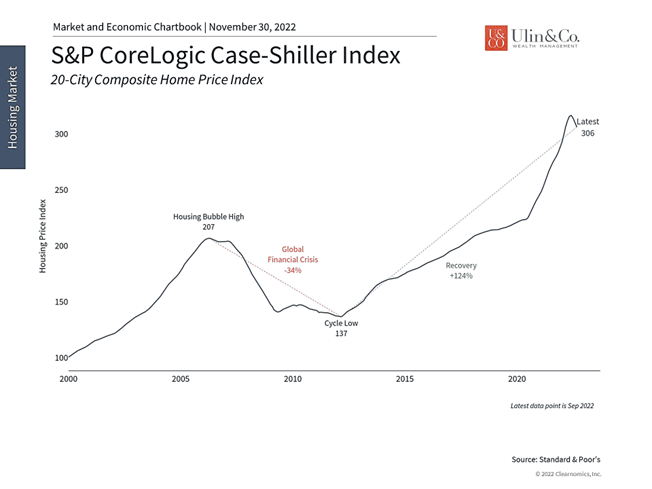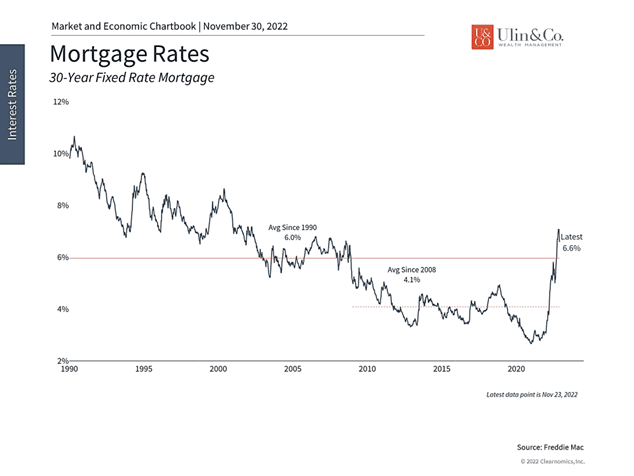Housing Recession is not a Big Short
Companies, sectors, and assets that swiftly accelerated up to the stratosphere through the pandemic are getting whipsawed back down to earth this year with quite a bit of emphasis on tech, crypto and now real estate valuations and pricing. With mortgage rates touching levels not seen since 2007 before the housing bubble imploded in 2008, many may be wondering if history may repeat itself as a housing recession progresses.
Contrarian investors antennas are up with 113 million search results on Google this week for “when is the housing market going to crash.” Let’s address the elephant in the room. Are we due for a repeat of the 2008-2009 debacle? Most likely not. The past couple years boom that is cooling off was not a house of cards built on high-risk loans and a leveraged financial system.
Remembering the Past
“Truth Is Like Poetry and Most People Hate Poetry” was a memorable quote from The Big Short. This Oscar nominated flick deftly covered the 2008 banking crisis and US housing market crash that took down Wall Street.
The stock market and housing crash of 2008 had its origins in the extraordinary growth of the subprime mortgage market beginning back in 1999 back in the Clinton era with the US government relaxing banking and lending regulations. The September 15th, 2008, bankruptcy filing by investment bank Lehman Bros. was the most memorable tipping point in the news, while nearly 9 million people lost their jobs and at least 10 million lost their homes.
These high-risk borrowers, some with no income, no job and no assets (referred to as NINJA loans) were provided home loans with little money down and allowed to take out adjustable-rate mortgages, which would start out with low monthly payments that would become much larger after a few years. Their time ran out at about the time real estate crashed putting them all “under water.”
Current Housing Recession Effects
While it may be remarkable to see record money flowing into real estate through and after the pandemic, this time is different. One of the beneficiaries of the lockdowns and social distancing measures had no doubt been the housing market as people spent exponentially more time at home from evolving virtual work as the new- normal, to an early retirement.
Perhaps no sector of the economy has been impacted by rising interest rates this year as much as housing. The declines in both housing activity and prices have wide-ranging effects on households and the economy, as well as across financial markets. The housing market surged during the pandemic and is now experiencing a hangover.
The housing market has made strong gains since 2012 but is slowing

The housing market affects the economy and financial markets in important ways. As individuals, primary residences are usually the most important assets on household balance sheets, and monthly mortgage payments are the largest expenses. As diversified investors, the housing market can represent an income-generating asset class as well as a macro-economic indicator. Rising home prices can bolster financial confidence and spur consumer spending, and vice versa, a fact often referred to as a “wealth effect.”
Housing prices accelerated during and after the pandemic as many sought to purchase new homes because they left cities, needed more space, or were working from home. In addition, robust consumer balance sheets and limited spending on other goods and services meant that consumers had the excess savings to consider major purchases. The chart above shows an index of housing prices across 20 major U.S. metropolitan areas and highlights the steep rise since 2020. This added to the gains since the housing market bottomed in 2012. Over this full period, the average home price in these areas rose 127%.
One measure of the economic impact of housing is what’s referred to as “residential fixed investment” in the quarterly GDP report. According to the Bureau of Economic Analysis, residential fixed investment increased by 7.2% and 10.7% on an annual basis in 2020 and 2021, respectively, contributing 0.28 and 0.47 percentage points to annual growth in those years. This has also added to inflationary pressures. In October, the shelter component of the Consumer Price Index, which has a weight of 42% within core CPI, rose 6.9% compared to the previous year. A red-hot housing market added to economic growth but also to the price pressures felt by many households.
Mortgage rates are at their highest since the mid-2000s housing bubble

More recently, the Case-Shiller index experienced its largest deceleration in its history. This is due to rapidly rising mortgage rates, the slowing economy, and the general reversal of pandemic trends that has impacted many economic and stock market sectors. The average rate on a 30-year fixed mortgage currently sits at 6.6% after briefly rising above 7% for the first time since 2002. This exceeds the 30-year average of 6% and is well above the average of 4.1% since 2008. Homebuyers and investors alike are experiencing sticker shock as rising rates make housing less affordable by pushing up mortgage payments, even as home prices decline. Many measures of housing activity have slowed as a result, from building permits and housing starts to existing home sales and mortgage refinancing.
Similarly, the S&P 500 real estate sector has fallen 25% this year, worse than the overall index decline of 16%. While privately held real estate may be holding up in value on paper, this is likely due to delayed mark-to-market adjustments. For those holding private real estate, this may not matter if there is steady rental income, especially if it can offset rising costs in this inflationary environment.
Existing home sales have slowed

Where does the dramatic rise and now decline in the housing market leave us through a housing recession? While the future is uncertain, market expectations are for rates to remain elevated alongside inflation. Even if the Fed does slow its pace of rate hikes, fed funds futures suggest that policy rates will hit 5% by mid-2023. Of course, it’s also unlikely that rates will surge as much as they have already. So, unless there is another surge in housing demand, the short-term path of home prices is likely to be sideways at best. Regardless, these factors could continue to affect the entire housing sector and detract from residential real estate activity.
The good news for investors as we discussed, is that a repeat of 2008 is also unlikely. Household balance sheets strengthened during the pandemic and many focused on paying off debts and shoring up savings. Additionally, the housing bubble was not just due to sky-high home prices and flawed loans- it was due to historic levels of financial leverage that led to systemic risks within and across banks. Fortunately, there are few signs that this is the case today.
The bottom line? While the housing market may face headwinds through the housing recession driven by high rates, many other parts of the economy are steady. Investors ought to remain diversified across sectors and construct their portfolios and financial plans with a broad view of their assets, including their real estate holdings.
For more information on our firm or to get in touch with Jon Ulin, CFP®, please call us at (561) 210-7887 or email jon.ulin@ulinwealth.com.
You cannot invest directly in an index. Past performance is no guarantee of future returns. Diversification does not ensure a profit or guarantee against loss. All examples and charts shown are hypothetically used for illustrative purposes only and do not represent any actual investment.
The information given herein is taken from sources that IFP Advisors, LLC, dba Independent Financial Partners (IFP), IFP Securities LLC, dba Independent Financial Partners (IFP), and its advisors believe to be reliable, but it is not guaranteed by us as to accuracy or completeness. This is for informational purposes only and in no event should be construed as an offer to sell or olicitation of an offer to buy any securities or products. Please consult your tax and/or legal advisor before implementing any tax and/or legal related strategies mentioned in this publication as IFP does not provide tax and/or legal advice. Opinions expressed are subject to change without notice and do not take into account the particular investment
objectives, financial situation, or needs of individual investors. This report may not be reproduced, distributed, or published by any person for any purpose without IFP’s express prior written consent. Housing Recession.




